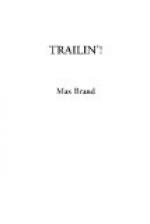To the Westerner a rope is a different thing. It is not so much a useful material as a weapon. An Italian, fighting man to man, would choose a knife; a Westerner would take in preference that same harmless piece of rope. In his hands it takes on life, it gains a strange and sinister quality. One instant it lies passive, or slowly whirled in a careless circle—the next its noose darts out like the head of a striking cobra, the coil falls and fastens, and then it draws tighter and tighter, remorselessly as a boa constrictor, paralyzing life.
Something of all this went through the mind of Bard as he lay watching the limp noose of the cowboy’s lariat, and then he nodded smiling.
“I suppose that seems an odd habit to some men, but I sympathize with it. I have it myself, in fact. And whenever I’m out in the wilds and carry a gun I like to have it under my head when I sleep. That’s even queerer than your fancy, isn’t it?”
And he slipped his revolver under the blankets at the head of his bunk.
CHAPTER XIX
THE CANDLE
“Yes,” said Nash, “that’s a queer stunt, because when you’re lyin’ like that with your head right over the gun and the blankets in between, it’d take you a couple of seconds to get it out.”
“Not when you’re used to it. You’d be surprised to see how quickly a man can get the gun out from under.”
“That so?”
“Yes, and shooting while you’re lying on your back is pretty easy, too, when you’ve had practice.”
“Sure, with a rifle, but not with a revolver.”
“Well, do you see that bit of paper in the corner there up on the rafter?”
“Yes.”
The hand of Bard whipped under his head, there was a gleam and whirl of steel, an explosion, and the bit of paper came fluttering slowly down from the rafter, like a wounded bird struggling to keep upon the air. A draft caught the paper just before it landed and whirled it through the doorless entrance and out into the night.
He was yawning as he restored the gun beneath the blanket, but from the corner of his eye he saw the hardening of Nash’s face, a brief change which came and went like the passing of a shadow.
“That’s something I’ll remember,” drawled the cowpuncher.
“You ought to,” answered the other quickly, “it comes in handy now and then.”
“Feel sleepy?”
The candle guttered and flickered on the floor midway between the two bunks, and Bard, glancing to it, was about to move from his bed and snuff it; but at the thought of so doing it seemed to him as if he could almost sense with prophetic mind the upward dart of the noose about his shoulders. He edged a little lower in the blankets.
“Not a bit. How about you?”
“Me? I most generally lie awake a while and gab after I hit the hay. Makes me sleep better afterward.”




